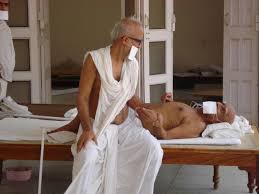New Delhi: It’s a tough set of questions: should Jains be allowed to practice Santhara? Is suicide the same as giving up one’s life voluntarily? Why should a non-Jain challenge the religious practice of a Jain? If the law is the same for everyone, then why shouldn’t we allow euthanasia?
The Supreme Court on Monday stayed a Rajasthan High Court order that had banned the centuries-old Jain practice of Santhara, or starving oneself to death to attain salvation.
On August 10, the high court had made Santhara a criminal offence under penal code sections 309 (attempted suicide) and 306 (abetment of suicide), punishable by jail terms of up to one year and 10 years, respectively.
The verdict had come on a public interest petition moved in 2006 by a non-Jain rights activist, Nikhil Soni. It prompted Jain organisations to move the Supreme court, arguing violation of Articles 25 (free profession, practice and propagation of religion), 26 (freedom to manage religious affairs) and 29 (protection of interests of the minorities).
The bench of Chief Justice H.L. Dattu and Justice Amitava Roy stayed the order and issued notices to the Centre and the Rajasthan government seeking their responses.

Rights activists compare Santhara to suicide, euthanasia and even Sati, arguing it is sometimes a way of getting rid of elderly relatives and grab their share of property. Accepting the logic, the high court had allowed the abetment charge against family and approximate community members.
The high court order also said: “The respondents (Jain organisations) failed to establish that Santhara is an essential religious practice without which the following of Jain religion is not permissible.”
The petitioners, represented by senior counsel Harish Salve and Abhishek Singhvi, have two main planks: religious freedom, and the differences between Santhara and suicide.
First, they have cited minority rights and the words “liberty of thought, expression, belief, faith and worship” in the Preamble to the Constitution.
Second, they have contended that Santhara has nothing in common with suicide or forced Sati since it is not performed under mental depression or duress.
“It is unwise and improper to link a sacred practice of the Jain religion… which is itself premised on ahimsa (non-violence) with suicide – an inherently violent act,” say the petitioners, who include the Sthanakvasi Jain Shravak Sangh.
In Santhara, “first the person tries to get himself rid of all gross passions, hatred, attachment, anger, pride, greed, deceit and finds contentment in renunciation of material pleasures”, they add.
“It is a process of curbing all desires… which ultimately results in bondage of the soul and loss of the state of eternal bliss.”
According to the Jain text Ratnakarandsravakacare, Santhara is permitted to the old, those afflicted with an incurable disease and those faced with a drought or grave physical danger.
While insisting that Santhara is entirely voluntary, the petitioners have argued that it also requires community endorsement.
“Santhara cannot be taken on one’s own choice… (but) only if permitted by the sadhak gurus, family, friends and relatives who are satisfied that death is imminent,” the petition says.
“Sallekhana (another name for Santhara) is not an abrupt renunciation of all food and sustenance but is a slow and systematic renunciation – first of the four vices, i.e. anger, pride, deceit and greed, then the desires of worldly pleasures, then the bondage of love and hatred.”
According to the Jains, a soul never dies – it only changes bodies till it achieves Moksha or the state of eternal bliss.
“Thus death, in Jainism, is not an end but a mere change, a departure of the soul from the body in order to acquire a new one unless the soul attains moksha,” the petition says.
Most of those who sit on Santhara draw crowds seeking a darshan and blessings, and are later honoured with huge funeral processions.


I think that I should have the right to decide whether it is time for me to go, and I should be allowed a painless option to unburden this earth from my polluting presence when the right time comes.
But it’s also true that many people will kill off their grandparents or older relatives who are depending on them in this way. So, if you are given the right to kill yourself, somebody may kill you and say it was youyr ‘legal suivide’